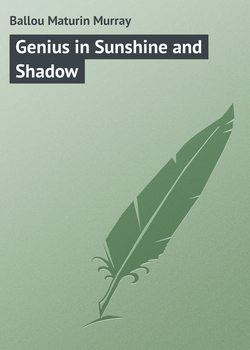Genius in Sunshine and Shadow

Реклама. ООО «ЛитРес», ИНН: 7719571260.
Оглавление
Ballou Maturin Murray. Genius in Sunshine and Shadow
PREFACE
CHAPTER I
CHAPTER II
CHAPTER III
CHAPTER IV
CHAPTER V
CHAPTER VI
CHAPTER VII
CHAPTER VIII
CHAPTER IX
CHAPTER X
CHAPTER XI
CHAPTER XII
Отрывок из книги
The ever-flowing tide of time rapidly obliterates the footprints of those whom the world has delighted to honor. While it has caused heroic names, like their possessors, to lapse into oblivion, it has also shrouded many a historical page with the softened veil of distance, like ivy-grown towers, rendering what was once terrible now only picturesque. In glancing back through thousands of years, and permitting the mind to rest on the earliest recorded epochs, one is apt to forget how much human life then, in all its fundamental characteristics, was like our own daily experience. There never was a golden age; that is yet to come. The most assiduous antiquarian has only corroborated the fact that human nature is unchanged. Conventionalities, manners and customs, the fashions, may change, but human nature does not. As an example of the mutability of fame, we have only to ask ourselves what is actually known to-day of Homer,1 Aristophanes, and their renowned contemporaries, or even of our more familiar Shakespeare?2 Of the existence of the first named we have evidence in his two great epics, the Iliad and the Odyssey; but, though deemed the most famous poet that ever lived, we do not even know his birthplace.
The cautious historian only tells us that he is supposed to have flourished about nine hundred years before the time of Christ; while there are also learned writers who contend that no such person as Homer3 ever lived, and who attribute the two most famous poems of antiquity to various minstrels or ballad-mongers, who celebrated the "tale of Troy divine" at various periods, and whose songs and legends were fused into unity at the time of Pisistratus.
.....
Ebenezer Elliott, the English "Corn-Law Rhymer,"20 was a blacksmith, but a poet by nature, and his songs created a political revolution in his native land, though unlike Béranger's, in France, it was a peaceful revolution. He was ever a true champion of the poor and oppressed. In the latter portion of his life he was in easy pecuniary circumstances. William Lloyd Garrison,21 the beloved philanthropist, orator, and writer, was born in poverty, and was early apprenticed to a shoemaker, but became a journeyman printer before his majority. He suffered imprisonment for his opinions' sake, and may be said to have been the father of Abolitionism in America, fortunately living long enough to see the grand effort of his life crowned with success, in the emancipation of the blacks and the abolishment of slavery throughout the length and breadth of his native land. Kepler, the famous German astronomer, was the son of a poor innkeeper, and though enjoying royal patronage, often felt the pressure of poverty. Coleridge said: "Galileo was a great genius and so was Newton; but it would take two or three Galileos and Newtons to make one Kepler." We owe our knowledge of the laws of the planetary system to him.
Sir Richard Arkwright, inventor of the spinning-jenny, and founder of the great cotton industries of England, never saw the inside of a schoolhouse until after he was twenty years of age, having long served as a barber's assistant. Justice Tenterden, and Turner, greatest among landscape-painters, were also brought up to the same trade. James Brindley, the English engineer and mechanician, and Cook, the famed navigator, were day-laborers in early life. Romney, the artist, John Hunter, the physiologist, Professor Lee, the Orientalist, and John Gibson, the sculptor, were carpenters by trade. Shakespeare was a wool-comber in his youth. These low estates, the workshop and the mine, have often contributed liberally to recruit the ranks of those whom the world has recognized as men of genius.
.....